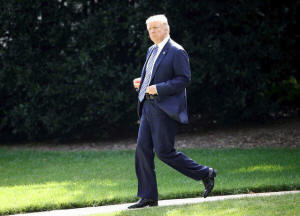|
U.S. businesses fear Trump mishandling of
China IP, trade probe
 Send a link to a friend
Send a link to a friend
 [August 04, 2017]
By Ginger Gibson [August 04, 2017]
By Ginger Gibson
WASHINGTON (Reuters) - U.S. President
Donald Trump's threat to investigate China's intellectual property and
trade practices is valid, but his administration may not be up to the
delicate task of carrying out a new China probe without sparking a
damaging trade war, U.S. business lobbyists told Reuters on Thursday.
The lobbyists' fears that Trump could mishandle such an inquiry came as
he searched for ways to increase pressure on China to do more about
reining in North Korea's nuclear and missile programs, with trade policy
viewed as a useful lever.
Lobbyists said Trump was right to criticize China on trade, but they
expressed concern about general disorganization and inconsistency at the
White House and warned that Trump might make matters worse with China if
he follows through.
"Companies, I think, are rightly concerned about how this administration
will handle any sort of enforcement action or investigation given that
we have not seen this administration be particularly nuanced or
strategic in its approach," said a technology industry source who asked
not to be identified because the issue is still under consideration by
the White House ahead of a public announcement.

Trump is expected to issue a presidential memorandum declaring Chinese
theft of intellectual property a problem that requires a U.S. response.
At the same time, U.S. Trade Representative Robert Lighthizer is
expected to launch an investigation based on Section 301 of the Trade
Act of 1974.
The White House had been expected to make an announcement on Friday, but
it has been postponed.
Section 301, a popular trade tool in the 1980s that has been rarely used
in the past decade, could lead to the president unilaterally slapping
tariffs or other trade limits on China. The Section 301 process also can
bypass the World Trade Organization procedures for adjudicating global
trade grievances. Though widely used worldwide, the WTO process is
viewed unfavorably by the Trump administration.
Trump's willingness to use "obsolete U.S. trade law," could create
problems, said Chad Bown, a trade expert at the Peterson Institute for
International Economics, a private think tank. "While the administration
has identified a legitimate policy problem, Trumpís proposed solution
may only make matters worse."
[to top of second column] |

President Donald Trump walks to Marine One as he departs for a day
trip to West Virginia from the White House in Washington, U.S.,
August 3, 2017. REUTERS/Joshua Roberts

As speculation of a Section 301 probe rippled through Washington, a
diplomatic deal that includes China appeared to be taking shape at
the United Nations on Thursday that would impose stronger UN
sanctions against North Korea.
In addition to the United States, the European Union, Japan, Germany
and Canada have all expressed concern about China's behavior on
intellectual property theft. The technology sector has been
especially hard hit in IP disputes.
"Our members generally support trade enforcement, but want the
administration to be careful those actions don't lead to a trade
war," said an official with one business trade group, asking not to
be identified because the White House had not yet made an
announcement.
Business lobbyists have been in talks with the White House on the
issue, but some reported uncertainties.
"Weíve been talking with (National Security Council) but frankly for
us even, it's difficult to determine exactly who are the decision
makers," the technology industry source said.
"We just donít know exactly what the mentality will be or ... the
decision making or calculus."
(Additional reporting by David Lawder, Lesley Wroughton and Steve
Holland; Editing by Kevin Drawbaugh and Lisa Shumaker)
[© 2017 Thomson Reuters. All rights
reserved.]
Copyright 2017 Reuters. All rights reserved. This material may not be published,
broadcast, rewritten or redistributed.

 |